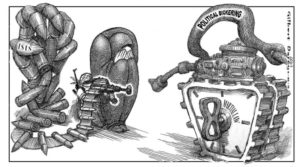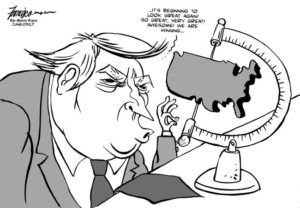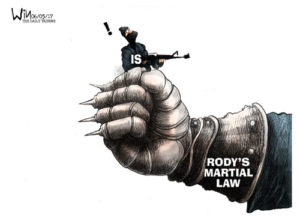It’s best to follow the Constitution
There is a reason for all those new provisions on martial law in the 1987 Constitution – which is what we now have. The Constitutional Commission that drew it up in the first year of the new Corazon Aquino administration wanted to make sure that the excesses of the Marcos martial law period from 1972 to 1981 would never be repeated.
The martial law declared in 1972 was governed by the 1935 Constitution, whose Article VII, Section 11(2) provided: “The President shall be the commander-in-chief of all armed forces of the Philippines and, whenever it becomes necessary, he may call out such armed forces to prevent or suppress lawless violence , invasion, insurrection, or rebellion. In case of invasion, insurrection, or rebellion, or imminent danger thereof, he may suspend the privilege of the writ of habeas corpus, or place the Philippines or any part hereof under martial law.”
President Marcos in 1972 declared there was imminent danger of a Communist invasion and thus declared martial law. He abolished Congress and proceeded to rule by presidential decree. Martial law continued for the next nine years, and was officially ended in 1981, but the climate of fear and repressions continued for years after that, until 1986 when People Power at EDSA ousted him.
In their desire to avert a repetition of that unfortunate period in our history, the framers of the 1987 – our present – Constitution amended the section on martial law. The provision “in imminent danger thereof” was removed, as this had been used as a reason for the 1972 martial law. The President may proclaim martial law only “for a period not exceeding sixty days.”
Within 48 hours from the proclamation, Article VII, Section 18, continues, the President shall report in person or in writing to Congress and Congress, “voting jointly, by a vote of at least majority of all its Members in regular or special session, may revoke such proclamation or suspension, which revocation shall not be set aside by the President. If not in session, Congress shall convene “within 24 hours” without need for a call.
There are other restrictions: The Supreme Court may review the factual basis of the proclamation in a proceeding filed by any citizen. The civil courts remain in session – no military courts for civilians. The privilege of the writ of habeas corpus may be suspended only in case of rebellion or offense connected with invasion.
We expected Congress to meet in joint session – for how else could they vote jointly, as the Constitution requires? Instead, the House met and approved a resolution of support by an overwhelming voice vote. As for the Senate, it passed a resolution that at this time, there is no compeling reason to revoke the proclamation. If there had been a joint session, all the legislators would have been required to vote individually to determine whether there was a majority decision.
Do the leaders of Congress fear some members may speak out strongly during a joint session? It is very unlikely that this will happen, considering the widespread public support for the proclamation of martial law to stop the ISIS-linked Maute. Or, do the legislators want the anonymity of a voice vote?
There is talk that the issue may be raised to the Supreme Court, as the matter involves a constitutional issue. All this disputation might have been avoided if our legislators had simply followed the constitutional provision to the letter – that they vote jointly on the issue.














